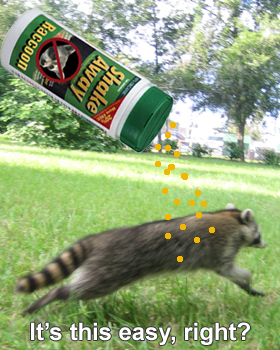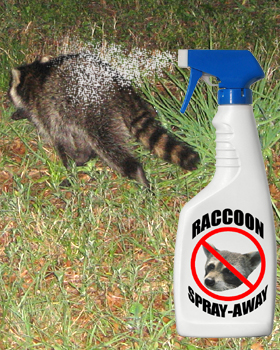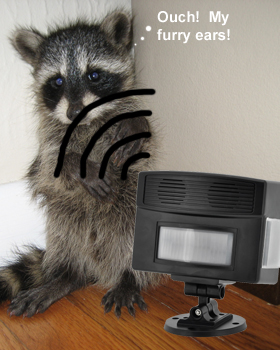Raccoon Eviction Fluid: This substance is made of the urine and gland excretions of an adult male raccoon,
preferably a large dominant one. This substance is very effective in
the specific scenario of intimidating a female raccoon with babies inside an attic, wall, chimney, or any other confined space where she has set up a den of baby raccoons. She knows that a male
raccoon will kill any young not its own, and the scent will likely convince her to move out, and bring her young with her. This is not a 100% effective product, and it helps to spread it liberally in
all areas of the attic, plus on and around the entry hole into the attic. But it does work very well, and it is one of the tricks the pros use for humane removal of raccoons from attics.
Extremely Hot Pepper Oil: Police-grade pepper spray or any
extremely hot pepper spray, paste, or oil, will keep most any mammal from at least wanting to touch or chew on a specific
area. So you can spray it or baste it (with a brush) on any surface you don't want a raccoon to touch. For example, if raccoons frequently climb a certain area, like a fence or downspout, you can apply
hot pepper oil there. Same for around a garden, etc. You can put the hot pepper oil in a spray mixture with a little dish detergent to help it stick to plant surfaces. Some people recommend cayenne pepper, but
at only 30-50k Scoville units, that's not hot enough in most cases. Be sure to exercise caution
if you use hot pepper! Gloves and a respirator mask are recommended. If you breathe in or touch the oil, you will know it!
Physical Barriers: Barriers aren't really a repellent
per say, but they are often the best way to keep raccoons away from an area or out of a certain place. For example, it'd be better
to keep the garbage cans inside, or in a wooden bin, than to spray a repellent on the cans. It would be better to use a single-strand electric fence to keep raccoons out of a garden, rather than to try
to shake some worthless critter repellent in the area. It's better to seal shut any open areas on your roof vents or soffits that lead into the attic, rather than try some gimmicky light or sound machine
in the attic.
Predator Urine: You will find many products sold online that contain predator urine, such as coyote urine, fox urine, bobcat urine, or even bear urine. It can be sold in liquid or granule
form, and often mixed with other ingredients, like mothballs. It's a good idea in theory. Maybe the scent of a bigger, badder, predator animal will scare away the raccoons! However, in practice, it's been
repeatedly shown to have zero effect on raccoons. The only time it might be effective is if it's straight urine, properly sourced, and placed in an attic or chimney space to intimidate out a
mother raccoon. But truth be told, your very physical presence in the attic applying it is often pressure enough to make a female move out. The granules you buy online with urine do nothing, and certainly
don't effect raccoon behavior outdoors.
Moth Balls: These are cheap to make, (the chemical is called
naphthalene) and they smell strong, so they are used as a cure-all critter repellent for almost every species. Raccoon Flake Away! Bat-B-Gone! Critter Ridder! Etc.
Repeated university studies (and our own repeated experience here at Humane Wildlife Removal Org) have shown that wildlife do not respond to the scent of moth balls. Moth balls do not work as a raccoon repellent.
They DO, however, poison the environment. Please don't use them. We know it's tempting when the sellers "guarantee success!". Go ahead and try them, and when they fail, back to square one.
Ammonia: If you've done research elsewhere, you may have read that ammonia, or ammonia soaked rags, will do the trick. Like with mothballs, this simply doesn't work. A raccoon won't stop living in a certain
area, or visiting a certain food source, because of an offensive odor. They are fighting to survive, and it's better to deal with some bad scent than lose food or shelter. Ammonia doesn't work, and neither does vinegar, or
bleach, or any other strongly-scented fluids.
Human Hair: No, in fact, raccoons in urban areas actively seek out humans, and their dwellings and garbage. You may have noticed that urban raccoons basically have no fear of humans. The same goes for
any scent, in general - it just doesn't work as a raccoon repellent.
High-Pitch Noise Machine: Many manufacturers sell ultrasonic sound machines with the promise of warding off pests. They emit high-frequency, ultrasonic sounds that humans supposedly can't hear, but which
raccoons can. The claim is that raccoons hat the noise, and will flee the area. First of all, we have to say that many humans absolutely can hear these devices. Second, they do not affect raccoon behavior, or any known animal
behavior, at all. We have witnessed countless cases of people purchasing and using these cheap and worthless machines, and never solving the problem. In fact, the FTC (Federal Trade Commission) has issued an official warning
that these devices are fraudulent.
Strobing Light Machine: Some manufacturers sell lights that flash and strobe. They are meant primarily for use in an attic. Just like with the high-pitch noise machines, they do no affect raccoon behavior.
Even if they found the lights annoying, they could seek out plenty of dark crevices to den in. As stated before, any demonstration of their effectiveness is much more likely to be due to your very physical presence in the
attic installing the light, and the sight of an actual large predator animal (you) it is often pressure enough to make a female raccoon move out of the attic.



